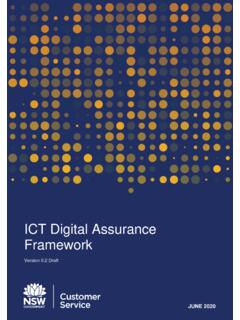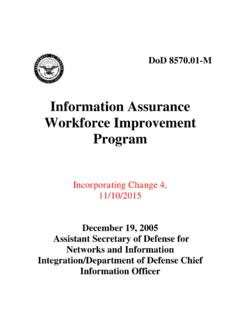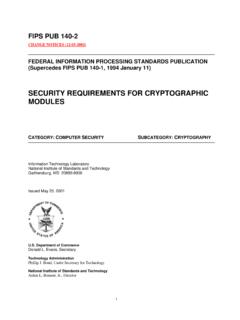Transcription of NSW Cyber Security Policy
1 Updated March 2021 NSW Cyber Security Policy Document number: Version number: Updated March 2021 Page 2 of 20 1 Policy Statement Overview Strong Cyber Security is an important component of the NSW Beyond Digital Strategy, enabling the effective use of emerging technologies and ensuring confidence in the services provided by NSW Government. Cyber Security covers all measures used to protect systems and information processed, stored or communicated on these systems from compromise of confidentiality, integrity and availability. Cyber Security is becoming more important as Cyber risks continue to evolve. We have also had rapid technological change resulting in increased Cyber connectivity and more dependency on Cyber infrastructure.
2 The NSW Cyber Security Policy (the Policy ) replaced the NSW Digital Information Security Policy from 1 February 2019. New requirements of the Policy include strengthening Cyber Security governance, identifying an agency s most valuable or operationally vital systems or information ( crown jewels ), strengthening Cyber Security controls, developing a Cyber Security culture across all staff, working across government to share Security and threat intelligence and a whole of government approach to Cyber incident response. The Policy is reviewed annually and updated based on agency feedback and emerging Cyber Security threats. Agencies must establish effective Cyber Security policies and procedures and embed Cyber Security into risk management practices and assurance processes.
3 When Cyber Security risk management is done well, it reinforces organisational resilience, making entities aware of their risks and helps them make informed decisions in managing those risks. This should be complemented with meaningful training, communications and support across all levels of the agency. Purpose The Policy outlines the mandatory requirements to which all NSW government departments and Public Service agencies must adhere, to ensure Cyber Security risks to their information and systems are appropriately managed. This Policy is designed to be read by Agency Heads and all Executives, Chief Information Officers, Chief Information Security Officers (or equivalent) and Audit and Risk teams.
4 Scope This Policy applies to all NSW government departments and Public Service agencies, including statutory authorities and all NSW government entities that submit an annual report to a Secretary of a lead department or cluster, direct to a Minister, or direct to the Premier. In this Policy , references to lead cluster departments or clusters mean the departments listed in Part 1, schedule 1 of the Government Sector Employment Act 2013. The term agency is Updated March 2021 Page 3 of 20 used to refer to any or all NSW government departments, Public Service agencies and statutory authorities. Please see guidance for more information. This Policy applies to: Information, data and digital assets created and managed by the NSW public sector, including outsourced information, data and digital assets; information and communications technology (ICT) systems, and Operational Technology (OT) and Internet of Things (IoT) devices that handle government or citizen data or provide critical government services This Policy specifies 25 mandatory requirements that all agencies MUST implement.
5 Agencies must continually improve their Cyber Security program. Uplift of Cyber Security Policy maturity should be approached through risk-based decision making to prioritise higher risks. Agencies that provide critical or higher risk services and hold higher risk information should implement a wider range of controls and be aiming for broader coverage and higher maturity levels. Agencies implementing high risk projects must seek additional guidance, strategies and controls when implementing their Security plan , including from supplementary sources mentioned in the useful links section. This Policy is not mandatory for state owned corporations, however it is recommended for adoption in state owned corporations, as well as local councils and universities as a foundation of strong practice.
6 For the purposes of this Policy , references to employees and contractors only applies to people who have access to organisation systems and/or ICT. Assistance implementing the Policy Cyber Security NSW can assist agencies implementing the Policy , with an FAQ document and guidelines on several Cyber Security topics. For copies of these documents or for advice regarding the Policy please contact Agencies must identify their central cluster Chief Information Security Officer (CISO) and maintain contact with them throughout the Policy reporting period, especially if they require assistance meeting the reporting and maturity requirements outlined. Exemptions Exemptions to this Policy will only be considered in exceptional circumstances.
7 To seek an exemption, contact your cluster CISO in the first instance. If the exemption request is deemed valid by your cluster CISO they will contact Cyber Security NSW on your behalf. Updated March 2021 Page 4 of 20 Summary of Your Agency s Reporting Obligations Cluster CISOs, and/or central cluster Cyber Security teams, are to coordinate Policy reporting across the entirety of their cluster. In April each year, Cluster CISOs are to provide Cyber Security NSW with an updated list of all agencies in their cluster and how they will be reporting, in a template provided by Cyber Security NSW. By 31 August each year, agency s must submit a report to their cluster CISO, or Cyber Security NSW, in a template provided by Cyber Security NSW, covering the following: 1.
8 Assessment against all mandatory requirements in this Policy for the previous financial year 2. A maturity assessment against the Australian Cyber Security Centre (ACSC) Essential 81 3. Cyber Security risks with a residual rating of high or extreme2 4. A list of the agencies crown jewels Agencies are to include an attestation on Cyber Security in their annual report and provide a copy to Cyber Security NSW by 31 August each year. If your agency does not complete an annual report, an attestation must still be completed and signed off by your Agency Head and submitted to your cluster CISO. 1 2 As sourced from the agency s risk register or equivalent and as required in TPP20-08 Internal Audit and Risk Management Policy for the NSW Public Sector: Updated March 2021 Page 5 of 20 2 Roles and Responsibilities This section outlines the roles and responsibilities an agency should allocate as part of their Cyber Security function.
9 An agency may not have all the roles outlined below. In these instances, the responsibilities must be allocated to another role at equivalent level within the organisation. Whilst agencies have flexibility to tailor these roles to their organisational context, all responsibilities must be allocated and performed. Those changed allocations of responsibilities should be clearly identified when reporting to Cyber Security NSW. See guidance for more information. ICT & Digital Leadership Group (IDLG) The IDLG is chaired by the Government Chief Information and Digital Officer (GCIDO) and is responsible for: Approving the Policy and any updates Ensuring its implementation across NSW Government Reviewing the summarised agency/cluster reports against the Policy s mandatory requirements Agency Heads The Secretary of a department is accountable for.
10 Appointing or assigning an appropriate senior executive band officer in the agency or across the cluster, with the authority to perform the duties outlined in this Policy this person should be dedicated to Security at least at the cluster level Appointing or assigning a senior executive band officer with authority for Industrial Automation and Control Systems (IACS) Cyber Security for the agency or cluster (if applicable) Ensuring all agencies in their cluster implement and maintain an effective Cyber Security program Supporting the agency s Cyber Security plan All Agency Heads3 ( Commissioners, Chief Executive Officers), including the Secretary of a department, are accountable for: Ensuring their agency complies with the requirements of this Policy and timely reporting on compliance with the Policy Ensuring their agency develops, implements and maintains an effective Cyber Security plan and/or information Security plan 3 The head of the agency listed in Part 2 or 3 of schedule 1 of the Government Sector Employment Act 2013.





